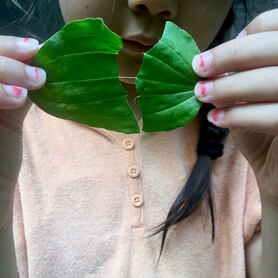 All hail plantain (genus plantago)! If you look down this summer there's a fine chance you will see some of this plant growing at your feet. ⠀ ⠀ Plantain species grow all over the world. Here in Vermont you can find this plant spring through fall in open sun, grassy areas/lawns, edges, sidewalks and parking lots, compacted or disturbed soils, or maybe your garden. ⠀ ⠀ The leaves grow is a basal rosette (adorable) from a fibrous taproot and are eye/oval shaped with stems/petioles that may change color near the root to more white, red, etc. The leaves are little bit waxy with veins running the length. A tall thin flowering stem comes up from the center of the plant and is covered in small discreet flowers that become neat seeds. ⠀ ⠀ There are many different species/kinds of plantain, but the most common in North America are Plantago major (probably traveled from Europe) and Plantago rugelli (endemic to Turtle Island/ North America). They are often found growing together. Another species you might see is Plantago lanceolata, who's leaves are longer and thinner. ⠀ ⠀ Next time you are bit by a spider, bee, or tick think to make a quick spit poultice by harvesting a leaf and chewing it up into a ball to place on the site. The drawing quality of plantain pulls venom and saliva out of bites. ⠀ ⠀ Plantain is a good healer for burns, scrapes, and all variety of wounds as the leaves are healing to tissue, anti-inflammatory, and antimicrobial. Plantain supports lung health via their expectoration and demulcent qualities. ⠀ ⠀ This plant contains both astringency and demulcency, which is uncommon. It is a big part of why this plant has such a wide-range of actions and is an incredible tonic for tissues and organs, (particularly those of the gastrointestinal tract, respiratory, and genito-urinary systems). ⠀ ⠀ Apart from the variety of poultices you could make, you can also make tea with fresh or dried leaves, eat the leaves fresh, or tincture. Plantain also makes a fine infused oils for salves or lip balms. Tea can be used as a hair wash or soak. ⠀ ⠀ What is your favorite way to work with this plant? By Susan Staley. Susan is a clinical and community herbalist with Railyard Apothecary. You can schedule a consultation with her or our other herbalists at www.burlingtonherbclinic.com. Here’s to your health!
4 Comments
|
Details
RAILYARDCheck in here to keep updated on news and activities at the apothecary. Archives
April 2024
Categories
All
|
railyard apothecary
*These statements have not been evaluated by the Food and Drug Administration. This product is not intended to diagnose, treat, cure, or prevent any disease. For educational purposes only.
|
|

 RSS Feed
RSS Feed
